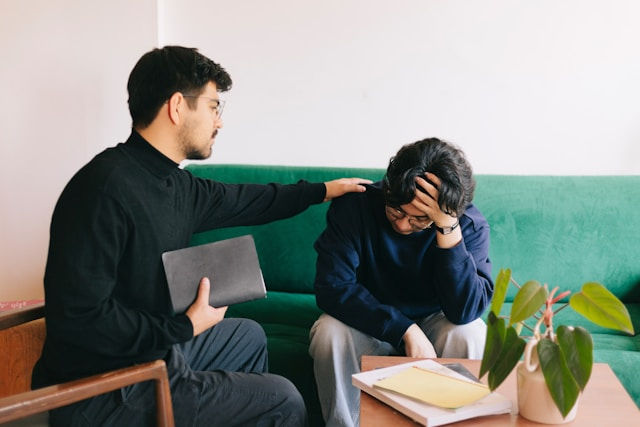A Trauma-Informed Approach to Preventing Workplace Violence in Healthcare
- Brainz Magazine

- Sep 8, 2025
- 4 min read
Written by Clifford Cartagena, CEO & Founder
Clifford Cartagena, RN, BSN, is a psychiatric nurse, safety trainer, and founder of Gentleway Systems LLC. Co-founder of Arizona Care Horizon Institute, he is completing his PMHNP degree at Walden University. Author of The Gentle Art of Crisis, he advances trauma-informed, dignified approaches to workplace safety.

Workplace violence has become an alarming norm in healthcare, leaving both staff and patients at risk. Beyond physical harm, the emotional toll erodes trust, safety, and the quality of care. The Gentleway System offers a new path forward, rooted in prevention, compassion, and trauma-informed practices, transforming moments of crisis into opportunities for connection and healing.

A silent epidemic in healthcare
Workplace violence in healthcare is no longer rare, it’s routine. Studies reveal that more than 80% of nurses have experienced violence at work. Beyond physical injuries, the hidden wounds include stress, burnout, and the emotional toll of feeling unsafe in an environment meant for healing. When staff are fearful, patients suffer. Care becomes reactive, trust is broken, and outcomes decline. Addressing workplace violence isn’t just about protecting employees, it’s about restoring the integrity of healthcare itself.
The gentleway philosophy
The Gentleway System was created to change how we approach safety. Inspired by the principles of Judo, “the gentle way,” this model emphasizes:
Prevention first: The safest crisis is the one that never happens.
Emotional intelligence: Words and presence are the strongest interventions.
Trauma-informed care: Respect and dignity remain central, even in moments of conflict.
Efficiency and safety: Minimum effort, maximum effectiveness, with restraint as the very last resort.
Team trust: A culture of mutual reliance. “Can I trust you with my life? You can trust me with yours.”
The goal isn’t to overpower patients, but to connect with them, protecting everyone involved.
Trauma-informed at every step
Traditional crisis management often defaults to seclusion or restraint. But research shows these measures can retraumatize patients and leave staff discouraged. The Gentleway System reframes aggression not as malice, but as fear, pain, or confusion.
By applying trauma-informed principles, staff can shift from confrontation to collaboration:
Safety: Both psychological and physical.
Respect: Separating the person from the behavior.
Collaboration: Clear communication and shared decisions when possible.
Empowerment: Offering choices to help restore control.
This approach reduces harm and builds trust, a far better foundation for recovery.
Words that heal instead of harm
In every volatile encounter, words matter most. Gentleway teaches communication that defuses rather than inflames:
“I want to make sure you’re safe.”
“You deserve respect, I will give you that.”
“Let’s find a way through this together.”
Instead of commands like “calm down” or “stop it,” staff use language rooted in empathy and respect. Delivered with the right tone and presence, these words often prevent situations from ever escalating.
Minimum effort, maximum efficiency
Gentleway utilizes the principle of redirecting energy instead of meeting it with force. Staff learn to:
Position themselves safely without cornering patients.
Maintain awareness of exits and blind spots.
Intervene physically only when absolutely necessary, and with the least force possible that protects the patients and staff from harm.
This is not weakness, it is skillful gentleness, a form of psychological judo that prevents injury and preserves dignity.
Built in real-world practice
Unlike many programs developed in theory, the Gentleway System was refined on the frontlines of psychiatric units, emergency rooms, correctional facilities, and memory care homes. Across more than two decades of practice, I have never been injured by a patient. That is not because of luck or strength, it is because prevention, communication, and trauma-informed awareness were always my first line of defense.
Why leaders should act now
Data shows most healthcare organizations still lack consistent de-escalation training and clearly defined violence prevention strategies. Staff feel unsafe, and patients feel disrespected. Implementing systems like Gentleway can help organizations:
Reduce injuries and turnover.
Lower reliance on restraints and seclusion.
Improve patient trust and outcomes.
Build resilient, compassionate teams.
Creating a true culture of safety requires more than policies. It requires a philosophy that staff believe in and can practice daily.
Final thought
Violence in healthcare is not inevitable. With foresight, training, and compassion, it can be prevented.
The Gentleway System offers a practical path forward rooted in safety, efficiency, and respect for human dignity.
As I remind every student and colleague:
“Prevention is not about fear, it is about wisdom. The wise see danger before it strikes. The Gentleway is the way of foresight.”
Read more from Clifford Cartagena
Clifford Cartagena, CEO & Founder
Clifford Cartagena, RN, BSN, is a psychiatric and medical-surgical nurse, hospice provider, safety trainer, and founder of Gentleway Systems LLC. He is also the co-founder of the Arizona Care Horizon Institute. He was authorized by the ADHS (Arizona Department of Health Services) to deliver the Memory Care Services Training in Arizona. Cliff is currently completing his Psychiatric Mental Health Nurse Practitioner (PMHNP) degree at Walden University. He is the author of The Gentle Art of Crisis. With more than 20 years of nursing and leadership experience, he developed the Gentleway System, a trauma-informed approach to preventing and managing assaultive behaviors across healthcare and beyond. Learn more here.









